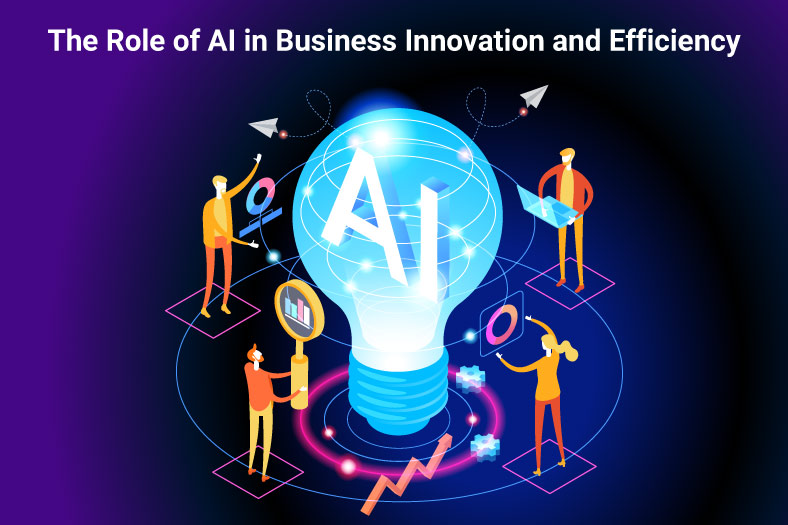Artificial Intelligence (AI) is reshaping business landscapes by automating complex tasks and providing insights that catalyse innovation and streamline operations. Today, AI is not just a futuristic concept but a practical asset that companies utilize to bolster productivity and optimize workflows.
In fact, 47% of companies are already leveraging AI to automate tasks in areas like customer service, cybersecurity, and supply chain management.
This highlights how crucial AI development services have become in helping businesses refine their processes and stay competitive. In this article, we’ll explore the multi-faceted role of AI in driving business innovation and operational excellence.
How AI Drives Business Innovation and Operational Efficiency
Regardless of your business’s specific industry, AI-driven innovation is unlocking new capabilities and revolutionizing traditional processes.
Let’s take a closer look at what is the role of AI in business decisions:
1. Streamlining Operations
One of the main benefits of AI in business is that it automates and optimizes routine tasks, which boosts efficiency and cuts operational costs. It excels in environments with repetitive and predictable tasks, allowing employees to concentrate on higher-level strategic work.
For example, one of the prominent use cases of AI in business is how Amazon integrates advanced robotics and AI in their fulfilment centres to sort, package, and ship items. This automation significantly speeds up the shipping process and allows the company to meet customer expectations for rapid delivery times.
2. Enhancing Customer Service
AI-powered tools like chatbots and virtual assistants interact with customers in real-time, quickly handling questions and solving problems faster than humans. They get better with each interaction, which helps them provide more personalized service. By the end of 2025, it’s expected that 19 out of every 20 customer interactions will be helped by AI.
For instance, Bank of America’s Erica, a result of AI-driven innovation, helps users by providing balance information, reminding them about bills, and suggesting ways to save money. This is all based on user behaviour and interaction patterns.
3. Optimizing Supply Chain Management
Artificial intelligence in businesses can anticipate supply chain disruptions by analyzing data trends and external factors like weather or traffic conditions. By integrating GPS tracking, companies gain real-time visibility into vehicle locations and shipment progress, enhancing their ability to react swiftly to unexpected delays. These predictive analytics and location-based insights allow companies to respond proactively and minimize dead time and subsequent revenue losses.
An example of this is Walmart which uses AI-driven innovation to predict demand by keeping an eye on inventory and improving deliveries. This ensures that products are available where and when the customers need them, reducing stockouts and overstock instances.
4. Driving Marketing Personalization
By looking at data from different places—like what people do online, what they buy, and how they interact on social media—AI helps companies make their marketing more personal. This means they can better match their ads and offers to what each customer likes and needs. Doing this makes customers more interested and likely to stick with the brand.
For example, Starbucks uses data from its loyalty cards and mobile apps to create personalized marketing messages and offers. This approach drives increased sales by recommending products that customers are likely to buy.
5. Facilitating Innovation in Product Development
AI and innovation accelerate product development, making it easier and quicker for organizations to develop, test and improve products. They can simulate various scenarios so that a product might be tested under all types of circumstances. This helps detect possible weaknesses or potential improvements in the early stages of the development life cycle. With AI, companies can learn in real time what users think of their products, then analyse that continuous feedback and implement targeted improvements.
For instance, BMW is implementing innovation with AI in virtual crash testing, which allows for a much quicker iteration of safety features. By simulating hundreds of crash scenarios quickly, artificial intelligence for businesses helps engineers refine car designs without the extensive time and cost associated with physical crash tests.
6. Improving Decision Making
AI-driven innovation helps businesses make smarter decisions by analysing large amounts of data to uncover patterns and predict future trends. This process, called predictive analytics, allows companies to spot potential problems before they happen, giving them time to adjust plans and avoid risks.
For example, a retailer might use AI and innovation to forecast which products will sell best during certain seasons, ensuring they stock the right items in advance.
7. Boosting Security and Compliance
AI and innovation bolster security by continuously monitoring data traffic for unusual patterns that may indicate a security breach. It also helps maintain compliance by automatically auditing and reporting business operations against regulatory requirements, thereby reducing the risk of costly legal issues.
For example, Mastercard utilizes AI to scan transactions in real-time for fraudulent activity. Its system analyses location, merchant, device data, and buying habits to flag and stop unauthorized transactions.
Wrapping Up!
AI-driven innovation is a significant part of assisting businesses to work more efficiently and grow quickly. It accelerates routine and day-to-day tasks, offers crystal-clear insights to make better business decisions, and provides new ways to serve customers. When it comes to AI business impact, it enables companies of all sizes and sectors to keep ahead of the curve and prepare for what lies ahead of them.
FAQs
What is artificial intelligence for businesses, and why does it matter?
AI or Artificial Intelligence innovation, is where machines learn from data and make decisions like humans. And it’s vital because it enables companies to save time, lower expenses, and discover multiple new ways to serve clients.
How is AI playing a part in bettering customer service?
AI-driven innovation and tools, including chatbots, can address typical questions extremely rapidly, even outside regular business hours. They also learn from every interaction, making them increasingly better at assisting customers over time.
Is AI only for large corporations?
Even small businesses can leverage AI to optimize tasks such as customer support, marketing, or even inventory management. Many AI solutions also come at an affordable price and can be set up easily and scale as your business grows. This makes innovation with AI accessible to companies of all sizes.
How do I select the best partner for AI development services?
Choose a provider with proven expertise in your domain, review their case studies, and confirm they use current AI and innovation tools. Ensure they communicate well, offer ongoing support, and clearly understand your project goals.
Caroline is doing her graduation in IT from the University of South California but keens to work as a freelance blogger. She loves to write on the latest information about IoT, technology, and business. She has innovative ideas and shares her experience with her readers.






